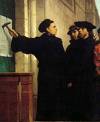----------------------
Happy Reformation Day
What is the significance of Luther’s break with Rome? Many Christians would readily acknowledge that Luther brought back free Gospel grace and freedom from the tyranny of Rome. But what exactly does that mean? Did Luther’s rediscovery of the Gospel only affect individuals? How did it change the world? Hopefully, this short series will open your eyes to the greatness of God’s work over 480 years ago.
On October 31, 1517, the eve of All Saints’ Day, an Augustinian monk, hammered 95 theses—short propositions—on the Wittenberg door in Germany. He was protesting the indulgences of Tetzel, who, purportedly announced: "As soon as the coin in the coffer rings, the soul from purgatory springs.” This
 system of indulgences was part of the larger system of baptism and penance and the Mass. Each a step in the works-salvation method of Rome. If a shrewd Christian could find the right confessor and some money, he could cover most sins while living like the Devil. In fact, even civil punishment could be avoided this way (Works of B. B. Warfield, Vol. IX, Studies in Theology, “The Nintey-Five Theses In Their Theological Significance”, p.497).
system of indulgences was part of the larger system of baptism and penance and the Mass. Each a step in the works-salvation method of Rome. If a shrewd Christian could find the right confessor and some money, he could cover most sins while living like the Devil. In fact, even civil punishment could be avoided this way (Works of B. B. Warfield, Vol. IX, Studies in Theology, “The Nintey-Five Theses In Their Theological Significance”, p.497).Hammering the thesis was a public declaration. An advertisement of sorts.
But it was more. It was a formal declaration against the Papal and Romish supremacy in matters of faith and life. The various theses fundamentally attacked the Romish church’s authority over the matter of salvation. It dismantled the churchly machine of Sacerdotalism—that mechanical view of redemption integrated into the church. It was claimed that salvation was found only in the Romish church through the Romish priests and the Romish sacraments. Good works were instrumentally necessary for salvation. In short, it was a works-salvation system. And although Christ was formally part of the process, He was not part and parcel to the entire schema.
In contrast, Luther wrote: “Every truly repentant Christian has a right to full remission of penalty and guilt, even without letters of pardon.” (Thesis 36). That is, Christians can have full remission of sin without Romish interference (“letters of pardon”). The believer had direct access to God. He needed no other mediator than Christ. Warfield explain the antithesis thusly:
“The fundamental difference between the two doctrines [Luther & Tetzel] is the fundamental difference between evangelicalism and sacerdotalism. Evangelicalism casts man back on God and God only; the faith that it asks of him is faith in God’s saving grace in Christ alone. Sacerdotalism throws him into the hands of the Church and asks him to put his confidence in it—or, in the indulgences, very specifically the Pope.” (ibid, 499).
This view was summarized by Luther: justification through faith alone, by grace alone on account of Christ alone. It was a view that was earlier discovered by Luther’s study of the book of Romans (about 1515 AD). And it is the view underlining the 95 Theses:
“What he here attacks is just the sacerdotal principle in one of its most portentous embodiments—the teaching that men are to look to the Church as the institute of salvation for all their souls’ welfare, and to derive from the Church all their confidence in life and in death. What he sets over against this sacerdotalism is the evangelical principle that man is dependent for his salvation on God and on God alone—on God directly, apart from all human intermediation—and is to look to God for and to derive from God immediately all that makes for his soul’s welfare. In these Theses Luther brought out of the academic circle in which he had hitherto moved, and cast into the arena of the wide world’s conflicts, under circumstances which attracted and held the attention of men, his newly found evangelical principle, thrown out into sharp contrast with the established sacerdotalism. It is this that made the posting of the Theses the first act of the Reformation, and has rightly made October Thirty-first the birthday of the Reformation.” (ibid, 511).
[Next: The churchly and societal impact of the Reformation]
(entire series here)
----------------------
“But what things were gain to me, these I have counted loss for Christ. Yet indeed I also count all things loss for the excellence of the knowledge of Christ Jesus my Lord, for whom I have suffered the loss of all things, and count them as rubbish, that I may gain Christ and be found in Him, not having my own righteousness, which is from the law, but that which is through faith in Christ, the righteousness which is from God by faith.” Phil. 3:7-9
SDG
No comments:
Post a Comment